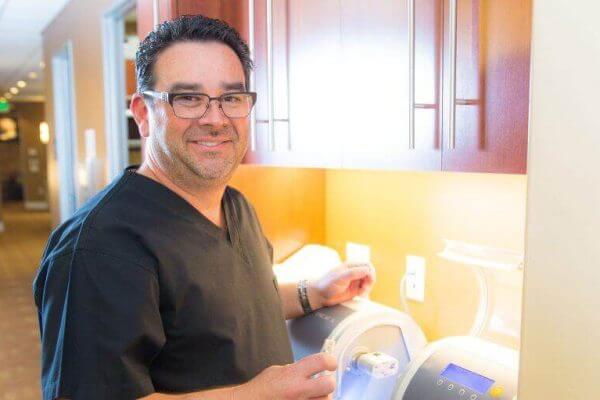How to Reverse Periodontal Disease
Teeth are anchored into the jaw by pockets formed by surrounding gum tissue. Once the outside structure has been compromised by plaque and bacteria, our teeth remain vulnerable to a spectrum of periodontal issues and future discomfort. These problems can often escalate, resulting in severe tooth decay and potential dental loss. Oftentimes, these problems require receding gum treatment to prevent or reverse periodontal disease.
Dental issues are misleading and often go untreated. Although oral problems can occur in children and teens, they are more prevalent in adults. According to a recent study released by the Centers for Disease Control (CDC), more than 50 percent of adult Americans are living with stages of gum recession, further classified as periodontal disease. The CDC’s statistics also cited approximately 12 to 14 percent of adults in the United States afflicted by advanced gum disease; one-fourth of all individuals aged 65 years or older reported losing all of their teeth as a result of the disease. If you require receding gum treatment or need help to reverse periodontal disease, Call Lakefront Family Dentistry at (951) 244-9495 or Request an Appointment Online Today!
Eroding Gum Line with Severe Plaque Buildup Causes Gingivitis and Periodontal Disease. Professional Treatment is Required.
Although many patients marginalize oral care when comparing everyday responsibilities, research shows a prevailing link between the condition of your mouth and other aspects of corporeal health.
Signs and Symptoms of Periodontal Disease
Do your gums bleed when you brush them? Does it hurt to eat, or do you have unmanageable breath odor? According to Dr. Derek B. Hauser, DDS, who has treated patients with gum concerns for more than 20 years, “anyone desiring an accurate diagnosis of the state of their gums and health of their teeth should schedule an appointment” with a dental professional. Dr. Hauser practices alongside his staff of registered dental hygienists at Lakefront Family Dentistry.
Gingivitis is the First Sign of Periodontal Disease
According to the American Academy of Periodontology, gingivitis can be prevented by receiving bi-annual dental cleanings and exhibiting overall decent oral and hygiene habits. Dr. Hauser notes, “The infectious bacteria buildup to tissue and bone surrounding the teeth is often responsible for the initial discomfort and swelling reported by many people.” Gingivitis can be fixed without surgery in cases of early prevention.
Gingivitis Facility Treatment and Care Options
Lakefront Family Dentistry specializes in non-surgical forms of gingivitis treatment, including a method known as scaling and root planting, during which Dr. Hauser and his registered dental hygienists remove plaque and tartar excess from above and below the surface of tooth enamel.
Products for at-home care are also available at Dr. Hauser’s office. It is imperative to maintain the integrity of your teeth and mouth tissue following any oral procedure to ensure complete effectiveness.
Prevention is the Best Medicine to Treat Periodontal Disease
According to the American Academy of Periodontology, causes of gingivitis include smoking, aging, insufficient nutrition, hormonal fluctuations, pregnancy, puberty, substance abuse, prescription or use of certain medications, substance abuse and HIV. Typically, there is no pain associated with gingivitis, and consequently, there are few telltale symptoms to identify the disease.
Prevention is essential, but if you find yourself facing early stages of the condition, there are still measures you can take to reverse periodontal disease. Dr. Hauser and his staff are more than willing to assess your individual requirements.
Dr. Hauser’s dental office also offers prescription-strength fluoride toothpaste gel, which prevents cavities and aids in rebuilding dental strength along with other home-care items.
Millions of Adults in the United States Face Periodontitis
If the bacteria causing gingivitis are not eliminated or the cause is not rectified, the condition advances to periodontitis. Plaque and toxins invade below the gums, causing irritation and inflammation. The pockets of tissue separating and protecting the teeth become infected. This tissue continues to affect the surrounding healthy cells, causing exponential decay. During this degenerative process, symptoms might go unnoticed.
Periodontitis attacks the structural integrity of each tooth and will eventually lead to loose teeth, which require removal.
There are Three Common Types of Periodontitis:
1. Chronic periodontitis is the most common form. The progression is generally slow; however, quick periods of structural change can occur. The process is initiated by the recession of gingivitis and the formation of infected pockets.
2. Aggressive periodontitis is seen in individuals who are classified as clinically healthy. It involves tissue loss and bone degeneration.
3. Early-onset periodontitis in children can be a precursor to more serious health conditions, including heart disease, respiratory disease and diabetes.
Pregnant Women Must Treat Periodontitis Immediately
According to a 2006 study released by the American Dental Association (ADA), periodontitis poses specific risks to women who are pregnant and their unborn child, citing a relevant link between periodontal disease and preterm births, low-birth-weight and other complications. The abstract states, “The studies indicate that periodontal infection can lead to placental-fetal exposure and, when coupled with a fetal inflammatory response, can lead to preterm delivery. Data from animal studies raise the possibility that maternal periodontal infections also may have adverse long-term effects on the infant’s development.”
Contact Dr. Hauser Today!
Dr. Hauser and his experienced staff at Lakefront Dentistry are here to help individuals and families with their dentistry needs. He uses the latest dental technologies and maintains the latest dental education for himself and staff. If you require receding gum treatment or need help to reverse periodontal disease, Call (951) 244-9495 or Request an Appointment Online Today!






